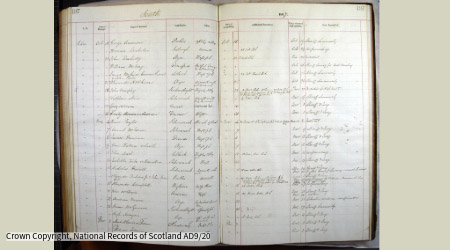Learning Zone - Sheriff Court Criminal Records
Quick facts
The Sheriff Courts handle a variety of criminal, civil, administrative and commissary matters. The earliest surviving sheriff court records date from the 16th century. There are Sheriff Courts around Scotland. Generally, in the periods we commonly work with in genealogy research we will find that there was a court in each county town with some counties having more than one court location, especially in areas where the population was expanding considerably.
Almost all Sheriff Court records are held by the National Records of Scotland in Edinburgh and are to be found under the reference ‘SC’ (for Sheriff Court) followed by a number unique to each Sheriff Court. For example, Glasgow is under reference SC36, Dundee is under SC45 and Kirkcudbright is under SC16.
Within each Sheriff Court the records are arranged by type. Here are some examples (this is not a comprehensive list):
Ordinary Court (Civil cases)
Small Debt Court
Commissary (wills etc.)
Criminal Courts
Deeds and Protests
Without an index you need to know first the location of the court, e.g. Edinburgh, Kilmarnock, Kirkcaldy etc., then the type of case you are looking for, then the date.
In this article, we will focus on criminal cases heard by the Sheriff Courts of Scotland. If you are interested in other court material, see the links below.

Finding Paternity Cases in Sheriff Court Records |

Registers of Deeds |

High Court of Justiciary |

Court of Session Records Index |

Finding Paternity Cases in Sheriff Court Records |

Registers of Deeds |

High Court of Justiciary |

Court of Session Records Index |
Criminal Court
There were (and still are) two categories of criminal trials heard at Sheriff Courts. These are jury or solemn trials and summary trials. What is the difference?
A jury trial is heard before the judge and a jury. A summary trial was heard by the judge alone and these were for lesser crimes.
Records vary from court to court, but generally speaking more records remain for jury trials. Often we find indictments and other written evidence in the processes, or case papers.
Sheriff Court records are held by the National Records of Scotland who have catalogued the records. You can access the catalogue here on their website. Records over 100 years old are open to the public but some more modern records are closed. Titles and descriptions are not uniform across Sheriff Court records. We may find records with the title ‘Record of criminal jury trials’. These are often volumes of ‘Criminal Libels’ bound together with minutes from jury trials. If we see ‘Criminal processes’ we would expect to see loose bundles of paperwork, often from jury trials but not always.
A record entitled, ‘Record of criminal trials’ could be either jury or summary trials. Analysing the catalogue may give a clue. For example, in Kirkcudbright Sheriff Court SC16/51 is titled ‘Record of criminal trials 1823-1865’ whereas SC16/52 is ‘Record of criminal jury trials 1819-1928’. As these dates overlap and one is labelled ‘jury trials’ this is an indication that SC16/51 could well be a record of summary trials.
The good news is that as our indexing increases the need to interpret the catalogue will become less necessary. Also, finding aids can assist a great deal.
Finding Aids
Work is ongoing to index criminal cases in Scottish Sheriff Courts. Although an index is by far the easiest way to access something it’s not the only way, another record may give us a clue which can help us pinpoint a record.
Prison registers tell us when a person was tried. If you find an entry in our index we can help you interpret the information and locate the court records.
We have also indexed Crown Counsel Procedure Books. This is a register of cases submitted to Crown Counsel for an opinion on how the case should proceed. These registers tell us which court was to hear the case.
Newspapers can also be very helpful. You can’t search these on our website but Findmypast and the British Newspaper Archive have a large collection. If you find your ancestor mentioned in relation to a criminal case just send us the entry and we can let you know if court records are likely to survive.





